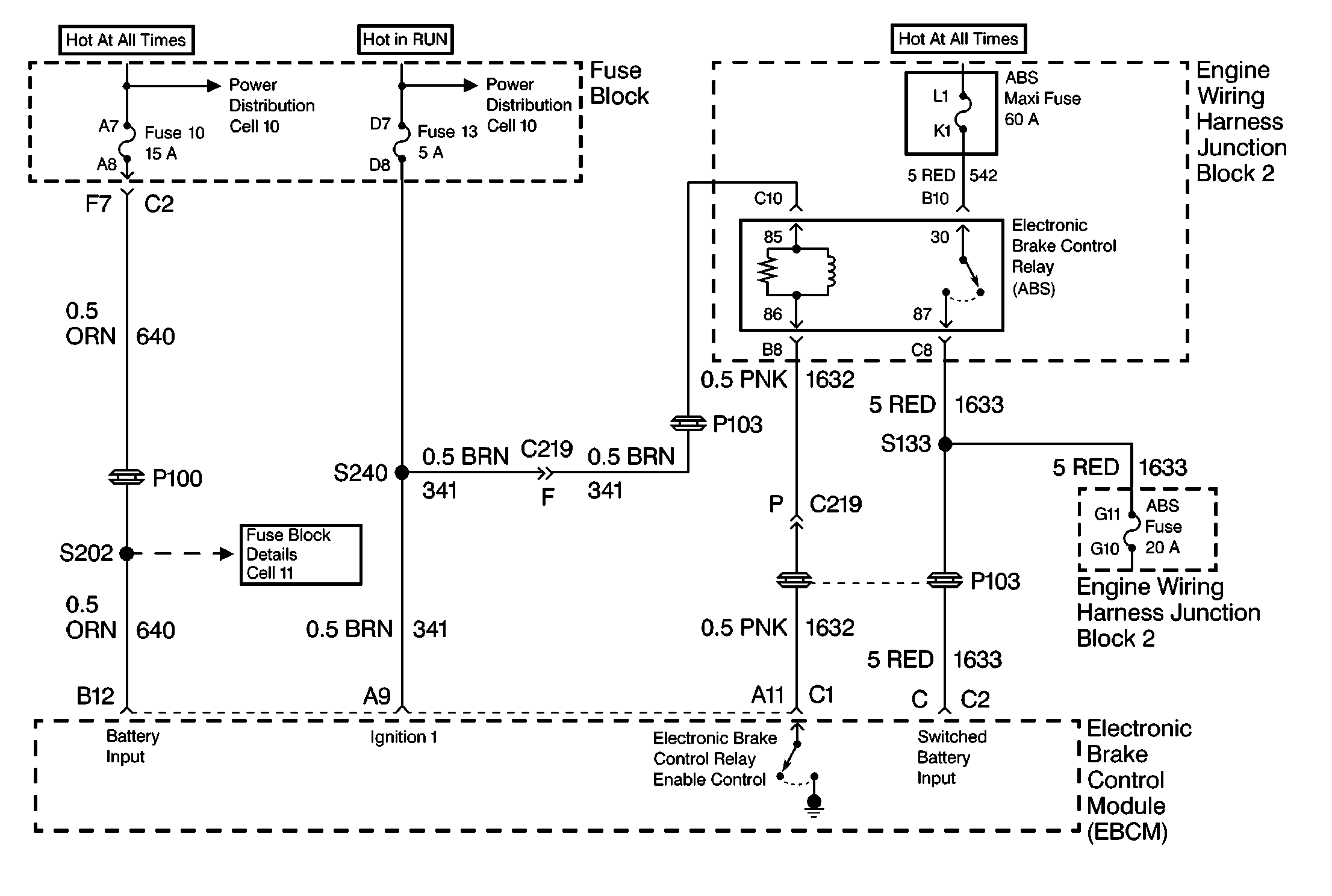
Circuit Description
Ignition voltage is supplied through terminal C10 of the Electronic Brake Control Relay. The above enables the EBCM to energize the pulling coil by completing the ground circuit at connector C1 terminal A11 of the EBCM. The magnetic field created closes the Electronic Brake Control Relay contacts. The magnetic field also allows battery voltage and current through the Electronic Brake Control Relay terminal C1 to be supplied to the EBCM through connector C2 terminal C. Connector C2 terminal C supplies power to the motors and solenoids.
Conditions for Setting the DTC
DTC C1218 can set after the EBCM commands the Electronic Brake Control Relay on.
The test monitors the availability of current/voltage to the motors and solenoids.
The above malfunction indicates voltage is not available to the motors and solenoids. The malfunction may not allow ABS operation.
Action Taken When the DTC Sets
| • | A malfunction DTC stores. |
| • | The ABS disables. |
| • | The amber ABS warning indicator turn on. |
| • | The red BRAKE warning indicator turns on if the rear piston in the ABS brake motor pack is not in the home position. |
Conditions for Clearing the DTC
| • | The condition responsible for setting the DTC no longer exists and the Scan Tool Clear DTCs function is used. |
| • | 100 drive cycles pass with no DTC(s) detected. |
Diagnostic Aids
The following conditions may cause an intermittent malfunction:
| • | A poor connection |
| • | Rubbed-through wire insulation |
| • | A broken wire inside the insulation |
Use the enhanced diagnostic function of the Scan Tool in order to measure the frequency of the malfunction. Refer to the Scan Tool manual for the procedure.
Thoroughly inspect any circuitry that may be causing the intermittent complaint for the following conditions:
| • | Backed out terminals |
| • | Improper mating |
| • | Broken locks |
| • | Improperly formed or damaged terminals |
| • | Poor terminal-to-wiring connections |
| • | Physical damage to the wiring harness |
Clear the DTCs after completing the diagnosis. Test drive the vehicle for three drive cycles in order to verify that the DTC does not reset. Use the following procedure in order to complete one drive cycle:
- Start the vehicle.
- Drive the vehicle over 16 km/h (10 mph).
- Stop the vehicle.
- Turn the ignition to the OFF position.
Important: Zero the J 39200 test leads before making any resistance measurements. Refer to the J 39200 user's manual.
Step | Action | Value(s) | Yes | No | ||||||||||
|---|---|---|---|---|---|---|---|---|---|---|---|---|---|---|
1 | Was the Diagnostic System Check performed? | -- | Go to Diagnostic System Check | |||||||||||
2 |
Do not start the engine. Does the Scan Tool indicate that the Electronic Brake Control Relay is off, and is the voltage equal to or greater than the specified voltage? | 0-10 V | ||||||||||||
3 |
Do not start the engine. Is the voltage less than or equal to the specified voltage? | 0-2 V | ||||||||||||
4 |
Is the resistance equal to or greater than the specified range? | 40 ohms | ||||||||||||
5 | Use the J 39200 in order to measure the resistance between the Electronic Brake Control Relay terminal B10 and the Electronic Brake Control Relay terminal C8. Is the resistance within the specified range? | OL (Infinite) | ||||||||||||
6 |
Are there signs of poor terminal contact, corrosion, or damaged terminals? | -- | ||||||||||||
7 |
Do not start the engine. Does DTC C1218 set as a current DTC? | -- | ||||||||||||
8 | Replace all of the terminals or connectors that exhibit signs of poor terminal contact, corrosion, or damaged terminal(s). Is the repair complete? | -- | Go to Diagnostic System Check | -- | ||||||||||
9 | Repair the short to voltage in CKT 1632. Is the repair complete? | -- | Go to Diagnostic System Check | -- | ||||||||||
10 | Replace the Electronic Brake Control Relay. Is the repair complete? | -- | Go to Diagnostic System Check | -- | ||||||||||
11 | Replace the EBCM. Refer to Electronic Brake Control Module Replacement . Is the repair complete? | -- | Go to Diagnostic System Check | -- | ||||||||||
12 | The malfunction is intermittent or is not present at this time. Is the action complete? | -- | Go to Diagnostic Aids | -- |
